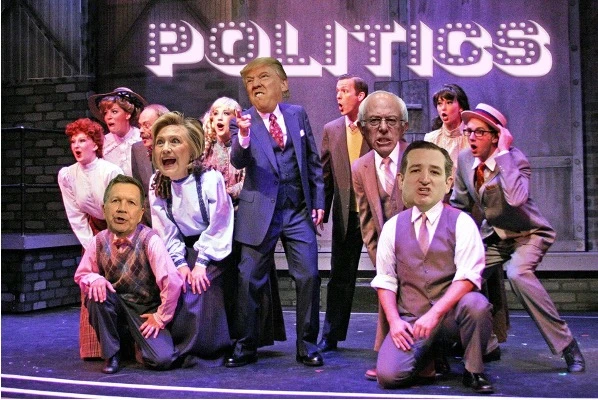SMALL HANDS WITH BIG CONSEQUENCES: MASCULINITY AND EMASCULATION AS RHETORICAL TOOLS IN PRESIDENTIAL PRIMARY DEBATES
GENDER PERFORMANCE
POLITICAL BEHAVIOR
Scholars tend to consider gender only in analyses that focus on the behavior of women in political leadership, women who vote, and women who are politically active. Evaluating the role of gender exclusively when women are present is a misrepresentation of the nature of gender and the way it functions in society. Gender performance, across gender identity, is enforced and mitigated by social convention of gender stereotypes and expectations. Trait literatures in multiple disciplines have extensively researched the qualities associated with leadership roles and consistently found that these ideal traits align with traits attributed to masculinity. The role of gender performance in leadership, particularly in the presidency, has not been studied from a political science perspective. I argue that politicians employ themes of masculinity when describing themselves as competent leaders; inversely, politicians will emasculate their opponents to assert their relative incompetency. I use the Republican presidential primary debates of 2016 to conduct a content analysis of candidate rhetoric. My preliminary findings indicate that the performance of masculinity, and the capacity to emasculate opponents, is highly mitigated by the candidate’s identity.

Hanson-Figueroa, Lauren. "Small Hands With Big Consequences: Masculinity and Emasculation as Rhetorical Tools in Presidential Primary Debates". PhD diss., Georgia State University, 2024.
ONGOING
CONGRESS IS FROM MARS & COURTS ARE FROM VENUS: RECONCEPTUALIZING OUR UNDERSTANDING OF INTERBRANCH RELATIONS
GENDER PERFORMANCE
POLITICAL INSTITUTIONS
In this Article, we argue for a reconceptualization of how to understand legislative-judicial relations in the United States. We propose that the Legislative and Judicial Branches of the U.S. government broadly reflect gender-stereotypical relations and divisions of labor in terms of both function and design. Congress was intended to be agentic and public, securely positioned as the public, lawmaking body; it fits the prototypical definition of Arendt’s “space of appearance.” The Legislative Branch can be conceptualized as men in a patriarchal culture, given agency and invited to action. In contrast, the courts reside in a more private sphere, toiling away in relative obscurity, removed from the public eye. Much like women in a prototypical patriarchal culture, courts’ work is both reactionary and mandatory—and often undervalued. The broader implication is that Congress takes advantage of its public nature to shout loudly and do little while transferring the work—and many times the blame—to the courts. Part I provides an overview of our theoretical reconceptualization of the court-Congress relationship, while Part II provides empirical support for our theoretical claims. Part III then discusses the implications of these empirical realities for the work of each branch and the views of the public.

Hanson-Figueroa, Lauren, Alexandra Piccirillo, and Amy Steigerwalt. "Congress is from Mars & Courts are from Venus: Reconceptualizing our Understanding of Interbranch Relations." Emory Law Journal 73, no. 2 (2023): 471.
2023
FOUCAULT AND THE ROLE OF PRIVATE PRISONS WITHIN THE IMMIGRATION INDUSTRIAL COMPLEX
IMMIGRATION
POLITICAL INSTITUTIONS
The detention and deportation of immigrants, both with and without federal authorization to reside in the United States, has been of particular normative saliency in the last four years. While a liberal reflection on the matter would yield an answer that undoubtedly references a political cleavage and polarization, Foucault encourages us to look harder at the puzzle and focus on the flow of power. Foucault urges an exposure of the proliferation of knowledge and who stands to benefit from its production, as well as the overarching economic emphasis in disciplinary power. The American immigration system is fundamental to the sustained systems of neoliberal discipline. I use several concepts from Foucault’s Discipline and Punish and his 1979 lecture series while at the Collège de France to investigate the rise and proliferation of the private prison industry and its neoliberal connection to the immigration industrial complex. I argue that the immigration industrial complex is an extension or expansion of neoliberal governmentality and disciplinary practices, and that private prisons contribute to this extension.

